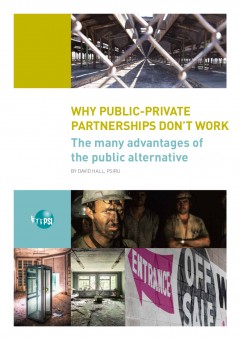
BACK TO THE FUTURE
by Rosa Pavanelli (PSI)
For decades the failures of water, energy, rail and health privatizations have made clear across the globe that those who promote privatization offer false promises. Elections have been fought and won on promises to keep public services in public hands. In sectors like health, education, water, energy and transport, community attitudes strongly support universal public provision.
Yet privatization and so-called public-private partnerships are coming back in fashion. Many governments are turning to public-private partnerships (PPPs) in the hope that the private sector will finance public infrastructure and public services which been savagely hit by the financial crisis. This hope has long run through the World Bank and OECD, but is now emerging in the G20 and the ongoing negotiations at the United Nations for the Sustainable Development Goals and the linked Financing for Development. If successful, privatization could become official UN policy.
Why such resurgence when the past 30 years experience shows that privatization is fundamentally flawed?
In the context of the economic crisis, governments are under increased pressure to find quick answers to hard questions about maintaining public services and funding infrastructure. The longer the crisis extends the more pressure mounts to find answers, but so do the risks of forgetting the root causes: greed, deregulation, and excessive faith in private corporations.
PSI’s report “Why Public-Private Partnerships (PPPs) don’t work” explores the importance of public investment. This accompanying report examines private sector motives, capabilities, influence and performance.
It is the culmination of thirty years experience with and assessment of privatization, in countries both rich and poor. It demystifies the shadowy PPP processes, most of which hide behind confidential negotiations to protect commercial secrecy. There are no public consultations, lots of false promises, and incredibly complex contracts, all designed to protect corporate profits. There is also a fair amount of bribery, as privatization contracts can be extremely valuable.
PPPs are used to conceal public borrowing, while providing long-term state guarantees for profits to private companies. Private sector corporations must maximize profits if they are to survive. This is fundamentally incompatible with protecting the environment and ensuring universal access to quality public services.
The report concludes that PPPs are an expensive and inefficient way of financing infrastructure and services. The report is an excellent working paper that PSI is proposing to affiliates to better understand privatization and its dangers. The different arguments need to be considered on their own merits and in conjunction with the others, as privatization is an inherently complex process. Unions can extract information from this reference document and apply it to their specific contexts.
Regrettably, most politicians and senior civil servants never access this type of information. Local and national governments and the UN are heavily influenced by the powerful lobby of the biggest services and financial corporations, global consulting and law firms, all intent on reaping profits from basic public services such as health, water, energy. It is our job, in alliance with social movements, to raise the alarm bells, to demand transparency and accountability of our public officials and elected politicians and to create mechanisms for systematic participation in decision making.
These privatization policies are also linked to the new wave of trade negotiations (TISA, TPP, TTIP), also secretive, without public consultation, agreed behind closed doors and heavily influenced by business interests. These trade deals not only facilitate PPPs but will also lock them in, making it next to impossible to reverse them, regardless of outcomes.
A further danger is the recent effort by the World Bank, the G20, OECD and others to ‘financialize’ PPPs in order to access the trillions of dollars held by pension funds, insurance companies and other institutional investors.
To access these funds, governments are advised to do a whole lot of PPPs at the same time in order to create a pool of assets that can then be bundled and sold on to long-term investors. This is exactly what the financial services companies did with home mortgages at the turn of the century, which brought us the global financial crisis of 2008.
The PSIRU report also points to the public alternative to privatization, in which national and local governments continue to develop infrastructure by using public finance for investment, and public sector organizations to deliver the service. This provides numerous benefits to the public such as greater flexibility, control, and comparative efficiency – because of reduced transaction costs and contract uncertainty, as well as economies of scale – and the efficiency gains of more democratic accountability.
PSI engages with national unions and with social movements. Our work on trade has brought new attention to the issue and has provoked a number of serious debates as to the merits of the ongoing negotiations. In the utilities sector, our work has helped provoke a wave of remunicipalizations around the world, most strongly in the water sector. And, our alternative to PPPs, public-public partnerships, based on solidarity and not profit, is having an effect in the development community.
Our work to protect the public interest is unending, but this report provides a boost to the evidence base and a shot in the arm to those seeking to defend public services for the benefit of all. As one of our powerful slogans clearly indicates: People and Planet Before Profits.
(This text is an excerpt from the original report)
The full report in English and Spanish is available here
